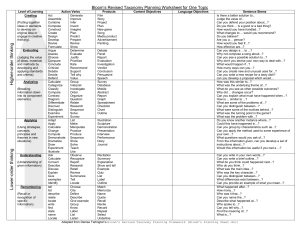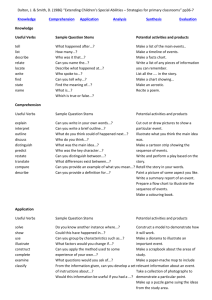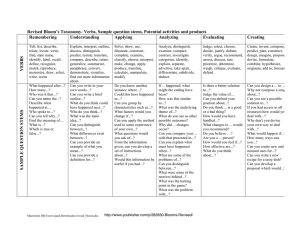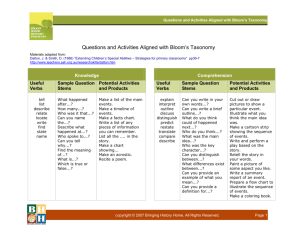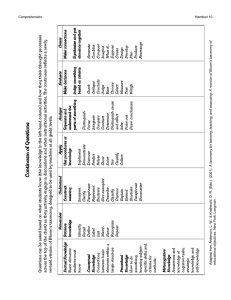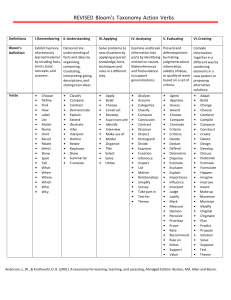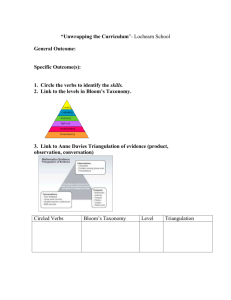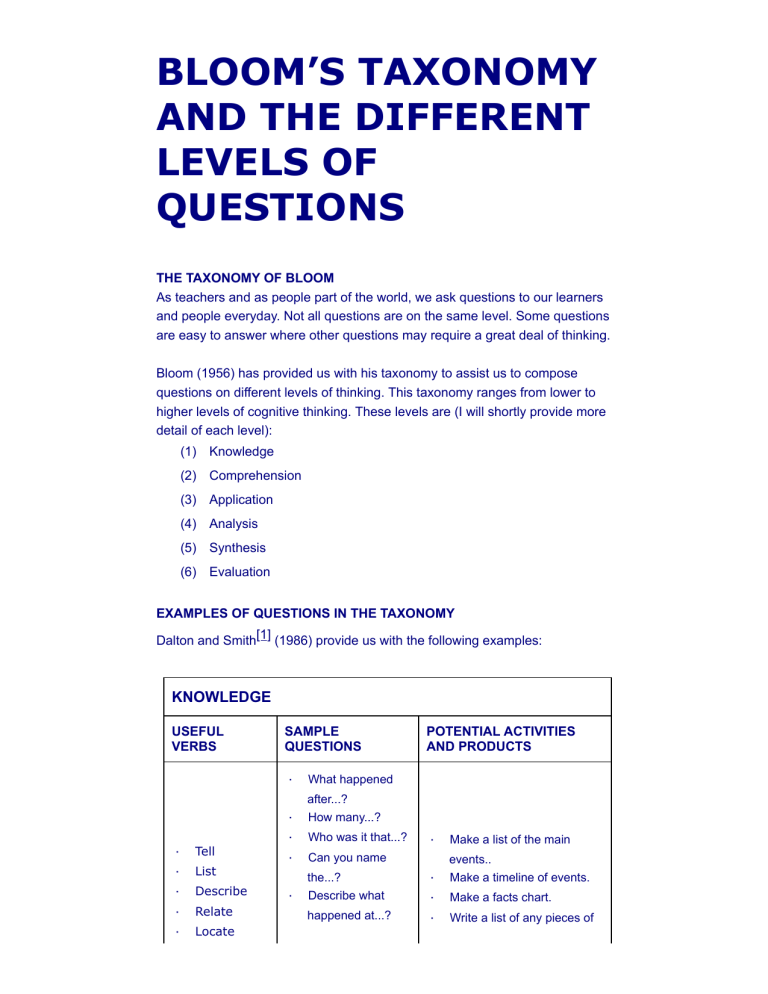
BLOOM’S TAXONOMY AND THE DIFFERENT LEVELS OF QUESTIONS THE TAXONOMY OF BLOOM As teachers and as people part of the world, we ask questions to our learners and people everyday. Not all questions are on the same level. Some questions are easy to answer where other questions may require a great deal of thinking. Bloom (1956) has provided us with his taxonomy to assist us to compose questions on different levels of thinking. This taxonomy ranges from lower to higher levels of cognitive thinking. These levels are (I will shortly provide more detail of each level): (1) Knowledge (2) Comprehension (3) Application (4) Analysis (5) Synthesis (6) Evaluation EXAMPLES OF QUESTIONS IN THE TAXONOMY Dalton and Smith[1] (1986) provide us with the following examples: KNOWLEDGE USEFUL VERBS · Tell · List · Describe · Relate · Locate SAMPLE QUESTIONS · What happened · after...? How many...? · Who was it that...? · Can you name · POTENTIAL ACTIVITIES AND PRODUCTS · Make a list of the main the...? · events.. Make a timeline of events. Describe what · Make a facts chart. happened at...? · Write a list of any pieces of · Write · Who spoke to...? information you can · Find · Can you tell · State · remember. List all the .... in the · Name · story/article/reading piece. Make a chart showing... why...? · Find the meaning · of...? What is...? · Which is true or false...? COMPREHENSION USEFUL VERBS · Explain · Interpret · Outline · Discuss · Distinguish · Predict · Restate · Translate · Compare · Describe SAMPLE QUESTIONS · Can you write in your · own words...? Can you write a brief outline...? · · · · Illustrate what you think · the main idea was. Make a cartoon strip showing the sequence Who do you think...? What was the main of events. · Write and perform a · play based on the story. Retell the story in your idea...? · Who was the key · character...? Can you distinguish between...? words. Paint a picture of some aspect you like. · What differences exist · · between...? Can you provide an · mean...? Can you provide a Write a summary report of an event. Prepare a flow chart to illustrate the sequence of events. example of what you · Cut out or draw pictures to show a particular event. What do you think could of happened next...? · POTENTIAL ACTIVITIES AND PRODUCTS · Make a colouring book. definition for...? APPLICATION USEFUL VERBS · Solve · Show · Use · Illustrate · Construct · Complete SAMPLE QUESTIONS · Do you know another POTENTIAL ACTIVITIES AND PRODUCTS · Construct a model to instance where...? demonstrate how it will · Could this have · · happened in...? Can you group by work. Make a scrapbook about characteristics such · the areas of study. Take a collection of · Examine · Classify · as...? What factors would photographs to demonstrate a particular you change if...? point. Can you apply the · method used to some experience of your · · suing the ideas from the study area. own...? What questions would · Make a clay model of an you ask of...? · item in the material. Design a market From the information strategy for your product given, can you using a known strategy develop a set of instructions about...? · Make up a puzzle game · Would this information be useful if you had a ...? as a model. Paint a mural using the same materials. · Write a textbook about... for others. ANALYSIS USEFUL VERBS · Analyse · Distinguish · Examine · Compare · Contrast · Investigate · Categorise · Identify · Explain · Separate · Advertise SAMPLE QUESTIONS · Which events could POTENTIAL ACTIVITIES AND PRODUCTS · have happened...? · to gather information. I ... happened, what · Write a commercial to might the ending have been? · sell a new product. Conduct an investigation · How was this similar · to...? What was the to produce information to · underlying theme of...? · · · information. Make a family tree · showing relationships. Put on a play about the Can you compare your ... with that study area. · presented in...? · Can you explain what · · What are some of the Prepare a report about the area of study. · Arrange a party. Make all the arrangements and ...? · Write a biography of the study person. must have happened when...? How is ... similar to Construct a graph to illustrate selected Why did ... changes occur? · support a view. Make a flow chart to show the critical stages. What do you see as other possible outcomes? · Design a questionnaire · record the steps needed. Review a work of art in · problems of...? Can you distinguish between...? · terms of form, colour and texture. · Review a film What were some of the motives behind...? · What was the turning point in the game? · What was the problem with...? SYNTHESIS USEFUL VERBS · Create · Invent · Compose · Predict · Plan · Construct · Design · Imagine · Propose · Devise · Formulate SAMPLE QUESTIONS · Can you design a ... POTENTIAL ACTIVITIES AND PRODUCTS · to ...? · Why not compose a · song about...? Can you see a specific task. · Design a building to · house your study. Create a new product. possible solution Give it a name and plan a to...? · If you had access to marketing campaign. · all resources how would you deal · · · What would happen if...? · song or pantomime about...? · · How many ways can code and write material suing it. Can you create new Sell an idea. and unusual uses · Devise a way to... for...? Can you write a new · Compose a rhythm or put dish? Can you develop a proposal which would... EVALUATION Make up a new language · recipe for a tasty · Design a record, book, or magazine cover for...? · you...? · Write a TV show, play, puppet show, role play, devise your own way to deal with...? Write about your feelings in relation to... with...? Why don't you · Invent a machine to do a new words to a known melody. USEFUL VERBS · Judge · Select · Choose · Decide · Justify · Debate · Verify · Argue · Recommend · Assess · Discuss · Rate · Prioritise · Determine SAMPLE QUESTIONS · Is there a better POTENTIAL ACTIVITIES AND PRODUCTS · Prepare a list of criteria solution to... to judge a ... show. · Judge the value of... · Can you defend your Indicate priority and ratings. · position about...? Do you think ... is a good or a bad thing? · · How would you have · Conduct a debate about an issue of special interest. · Make a booklet about 5 handled...? rules you see as What changes to ... important. Convince others. would you recommend? · Do you believe? · Are you a ... person? · How would you feel · if...? How effective are...? · What do you think about...? · Form a panel to discuss views, e.g. "Learning at School.". · Write a letter to ... advising on changes · needed at... Write a report. · Prepare a case to present your view about... [1] Dalton, J. & Smith, D., (1986). Extending Children’s Special Abilities: Strategies for primary classrooms (pp. 36-37). Or available at: http://www.teachers.ash.org.au/researchskills/Dalton.htm
